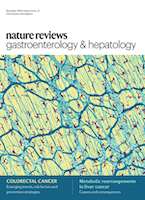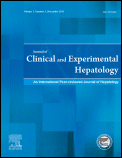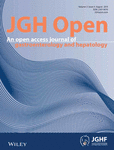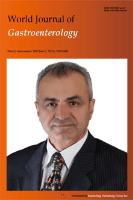
Nature Reviews Gastroenterology & Hepatology
Scope & Guideline
Your Gateway to Premier Gastroenterological Discoveries
Introduction
Aims and Scopes
- Microbiome and Gut Health:
The journal emphasizes the role of the gut microbiome in gastrointestinal health and disease, exploring its interactions with host physiology, immune responses, and its implications for conditions such as inflammatory bowel disease (IBD), liver diseases, and metabolic disorders. - Liver Diseases and Management:
A significant focus is placed on various liver diseases, including hepatitis, nonalcoholic fatty liver disease (NAFLD), and hepatocellular carcinoma (HCC). The journal discusses emerging therapies, clinical trial outcomes, and the pathophysiological mechanisms underlying these conditions. - Innovative Therapeutics and Clinical Trials:
Nature Reviews Gastroenterology & Hepatology highlights innovative therapeutic strategies, including the use of biologics, small molecules, and regenerative medicine approaches, along with detailed discussions on the design and outcomes of clinical trials. - Immunology and Inflammation:
The journal explores the immunological aspects of gastrointestinal and liver diseases, focusing on the roles of immune cells, inflammatory pathways, and the impact of immunotherapy on treatment outcomes. - Translational Research and Precision Medicine:
There is a strong emphasis on the translation of basic research findings into clinical practice, with a focus on precision medicine approaches that tailor treatments to individual patient characteristics and disease mechanisms. - Public Health and Epidemiology:
The journal also addresses the public health implications of gastrointestinal and liver diseases, including epidemiological trends, prevention strategies, and health disparities.
Trending and Emerging
- Artificial Intelligence and Machine Learning:
There is a notable increase in the exploration of artificial intelligence (AI) and machine learning applications in gastroenterology, particularly in diagnostic imaging, predictive analytics, and personalized treatment plans. - Microbiome Research and Therapeutics:
Research focusing on the gut microbiome as a therapeutic target is rapidly expanding, with increasing interest in microbiome modulation for managing gastrointestinal and liver diseases. - Patient-Centered Care and Health Equity:
Emerging themes around patient-centered care and health equity are gaining traction, emphasizing the importance of addressing social determinants of health and ensuring equitable access to care. - Immunotherapy and Novel Therapeutics:
The trend towards immunotherapy and other novel therapeutic approaches for treating liver cancer and IBD is growing, reflecting advancements in understanding disease mechanisms and treatment outcomes. - Environmental and Lifestyle Factors:
There is a rising focus on the impact of environmental and lifestyle factors on gastrointestinal health, including the effects of diet, pollution, and socio-economic status on disease risk and management. - Digital Health and Telemedicine:
The integration of digital health technologies, including telemedicine, into clinical practice is an emerging area of interest, particularly in the context of managing chronic gastrointestinal conditions.
Declining or Waning
- Traditional Dietary Approaches:
There appears to be a waning interest in traditional dietary management strategies for gastrointestinal diseases, as newer therapeutic interventions and precision medicine approaches gain prominence in research and clinical practice. - Conventional Imaging Techniques:
The emphasis on conventional imaging techniques for diagnosing gastrointestinal and liver diseases is decreasing, with a growing focus on advanced imaging modalities and biomarkers that offer more precise and detailed insights. - Generalized Liver Disease Management:
The discussion around generalized management strategies for liver diseases is declining, as more nuanced and specific treatment protocols tailored to individual patient needs and disease subtypes are being developed. - Basic Science without Clinical Relevance:
There is less emphasis on purely basic science studies that do not have immediate clinical relevance, as the journal increasingly prioritizes research that bridges the gap between basic science and clinical application.
Similar Journals

Gastrointestinal Disorders
Connecting Researchers to Revolutionize Gastrointestinal CareGastrointestinal Disorders is a prominent open-access journal published by MDPI, based in Switzerland, that focuses on the latest research and innovations in the fields of gastroenterology, hepatology, and immunology. Since its inception in 2019, the journal has provided a vital platform for researchers and professionals to disseminate their findings, engaging with a global audience keen on advancing knowledge in gastrointestinal health. With a dedicated commitment to high-quality, peer-reviewed articles, Gastrointestinal Disorders has gained recognition in 2023, achieving Q3 status in gastroenterology and notable rankings in several other categories, including a respectable position in the quartiles for hepatology, immunology, and oncology. Despite its recent establishment, the journal has quickly become a valuable resource, facilitating open access to critical insights in the study of gastrointestinal diseases and their management, ensuring that emerging research is readily available to inform clinical practice and educate future professionals.

Translational Gastroenterology and Hepatology
Connecting Research to Real-World Solutions in Hepatology.Translational Gastroenterology and Hepatology, published by AME Publishing Company, stands as a pivotal platform for advancing the understanding and treatment of gastrointestinal and liver diseases. With its focus on translational research, this journal aims to bridge the gap between laboratory discoveries and clinical applications, thus fostering improvements in patient care. Although specific metrics like H-Index and Scopus ranks are currently unavailable, the journal is committed to maintaining high standards of scholarly communication and excellence. As an open-access publication, it ensures that valuable findings are readily accessible to a global audience, promoting collaboration and innovation among researchers, clinicians, and healthcare professionals invested in gastroenterology and hepatology. The journal's dedication to disseminating groundbreaking research makes it an essential resource for those seeking to stay at the forefront of these ever-evolving fields.

World Journal of Hepatology
Connecting global researchers to advance hepatology knowledge.World Journal of Hepatology is a premier academic journal dedicated to advancing the field of hepatology. Published by BAISHIDENG PUBLISHING GROUP INC, this journal serves as a crucial platform for disseminating innovative research findings and critical reviews from around the globe. With its ISSN 1948-5182 and E-ISSN 1948-5182, the journal has established a notable presence since its inception in 2009, covering a wide range of topics relevant to liver diseases, including but not limited to hepatitis, liver cancer, and metabolic liver disorders. Currently ranked 41/82 in the field of hepatology by Scopus, representing the 50th percentile, it has achieved a Q3 quartile ranking in the 2023 category, underscoring its growing influence in the medical community. With a commitment to open access for its readership, the World Journal of Hepatology enriches the global discourse on liver health and disease management, making it an essential resource for researchers, clinicians, and students alike.

Journal of Clinical and Experimental Hepatology
Advancing liver health through groundbreaking research.The Journal of Clinical and Experimental Hepatology, published by Elsevier - Division Reed Elsevier India Pvt Ltd, is a premier platform dedicated to advancing the field of hepatology. With an ISSN of 0973-6883 and an E-ISSN of 2213-3453, this journal has gained recognition for its impactful contributions to both clinical practice and scientific research in the domain of liver health. Ranking in the Q2 quartile for Hepatology in 2023 and positioned at 33rd out of 82 in Scopus’s Hepatology category, it reflects a robust impact factor and a commitment to publishing high-quality, peer-reviewed articles. Researchers, clinicians, and students can engage with a wealth of open-access content covering the latest advancements, challenges, and insights in hepatology, as the journal aims to disseminate knowledge from 2011 through 2025. Join the community of experts as we explore critical developments in the understanding and treatment of liver diseases.

JGH Open
Unlocking Insights in Gastrointestinal HealthJGH Open is a prominent open-access journal dedicated to advancing knowledge in the fields of Gastroenterology and Hepatology, published by WILEY. Since its inception in 2017, the journal has served as a crucial platform for researchers, professionals, and students to disseminate innovative research findings and clinical insights. With an impact factor and Scopus rankings reflecting its steady growth—ranking in the 3rd quartile for both Gastroenterology (Q3) and Hepatology (Q3)—JGH Open is positioned within the competitive landscape of medicine. Its commitment to open access enhances the visibility and accessibility of high-quality research, ensuring that significant advancements in understanding diseases of the gastrointestinal tract and liver reach a broad audience. With a focus on collaboration and dissemination of knowledge, JGH Open aims to contribute to the global discourse and improve outcomes in gastrointestinal health.

JOURNAL OF PEDIATRIC GASTROENTEROLOGY AND NUTRITION
Transforming pediatric care with groundbreaking research.Journal of Pediatric Gastroenterology and Nutrition is a premier academic journal published by Wiley, focusing on the critical intersection of pediatric gastroenterology and nutrition. Established in 1982, this journal has been at the forefront of research and clinical practices for over four decades and continues to contribute invaluable insights to the fields of pediatrics and gastrointestinal health, boasting a Q1 ranking in Pediatrics, Perinatology and Child Health and a Q2 ranking in Gastroenterology as of 2023. The journal features a comprehensive array of original research, review articles, and clinical studies aimed at improving the understanding and management of pediatric gastrointestinal disorders and nutrient imbalances. Edited with expertise, the Journal of Pediatric Gastroenterology and Nutrition serves as an essential resource for clinicians, researchers, and students dedicated to advancing the well-being of children with digestive health issues. Readers can access the journal's impactful research studies through traditional subscriptions.

EUROPEAN JOURNAL OF GASTROENTEROLOGY & HEPATOLOGY
Elevating standards in gastrointestinal and liver research.The EUROPEAN JOURNAL OF GASTROENTEROLOGY & HEPATOLOGY, published by LIPPINCOTT WILLIAMS & WILKINS, serves as a key platform for disseminating cutting-edge research in the fields of gastroenterology and hepatology since its inception in 1989. With its ISSN 0954-691X and E-ISSN 1473-5687, the journal has established a prominent reputation, as reflected in its 2023 rankings, placing it in Q2 for Gastroenterology and Q3 for Hepatology. It is ranked #75 out of 167 in gastroenterology and #39 out of 82 in hepatology according to Scopus, highlighting its importance in advancing knowledge and clinical practices. While it does not currently offer open access options, the journal remains essential for researchers, healthcare professionals, and students seeking to stay abreast of significant developments and innovations in digestive health. By providing rigorous peer-reviewed articles, the EUROPEAN JOURNAL OF GASTROENTEROLOGY & HEPATOLOGY continues to contribute to the understanding and treatment of gastrointestinal and liver diseases, making it a vital resource in the medical community.

WORLD JOURNAL OF GASTROENTEROLOGY
Elevating research in gastrointestinal medicine.WORLD JOURNAL OF GASTROENTEROLOGY, published by BAISHIDENG PUBLISHING GROUP INC, stands at the forefront of gastrointestinal research, providing a critical platform for the dissemination of high-quality studies in the field. With an impressive impact factor reflected in its Q1 rankings in both Gastroenterology and Miscellaneous Medicine, this journal is recognized for its rigorous peer-review process and commitment to advancing knowledge and practices related to digestive health. Covering comprehensive scopes from clinical advancements to innovative therapies, the journal serves an essential role for researchers, clinicians, and students, enabling them to stay updated on the latest developments and findings from 1998 through 2024. The open access model facilitates broader accessibility, ensuring that groundbreaking research reaches a global audience. The journal's ranking within the top 15% of Scopus demonstrates its significant contribution to the academic community, making it a valuable resource for advancing the science of gastroenterology.

Cellular and Molecular Gastroenterology and Hepatology
Transforming the landscape of gastroenterology and hepatology.Cellular and Molecular Gastroenterology and Hepatology, published by Elsevier Inc, is a premier Open Access journal dedicated to advancing the understanding and treatment of gastrointestinal and liver diseases. Since its inception in 2015, this journal has established itself as a leading publication within its field, boasting impressive metrics with a 2023 Q1 ranking in both Gastroenterology and Hepatology. It ranks #10 out of 167 in Gastroenterology and #11 out of 82 in Hepatology on Scopus, placing it in the 94th and 87th percentiles, respectively. This journal aims to disseminate high-quality, peer-reviewed research that fosters innovative solutions for clinical challenges, making it an invaluable resource for researchers, healthcare professionals, and students alike. With open access, all published content is readily available to a global audience, ensuring that critical findings in cellular and molecular biology related to gastroenterology and hepatology reach those who can benefit the most from the latest advances in the field. For more information, please visit us at our address in San Diego, CA, or explore our articles online.

Gastroenterology Insights
Transforming Insights into Impactful DiscoveriesGastroenterology Insights is a premier open-access journal published by MDPI since 2009, focusing on essential research and developments within the fields of gastroenterology and hepatology. With a dedicated ISSN of 2036-7414 and E-ISSN 2036-7422, this journal serves as a vital platform for disseminating innovative studies and insights pertinent to gastrointestinal health, disorders, and treatment modalities. Based in Switzerland, Gastroenterology Insights boasts a significant academic presence, currently positioned in the Q3 quartile for both gastroenterology and hepatology categories as of 2023, reflecting its impactful contributions to the disciplines. With Scopus rankings placing it at the 94th and 48th positions in gastroenterology and hepatology respectively, the journal is committed to advancing knowledge and fostering collaboration among researchers, professionals, and students alike. By providing an open-access model, it ensures that high-quality research is accessible globally, thereby enhancing the reach and impact of crucial findings in the science of digestive health. Researchers looking to publish cutting-edge work will find Gastroenterology Insights a valuable resource for both sharing and acquiring knowledge.